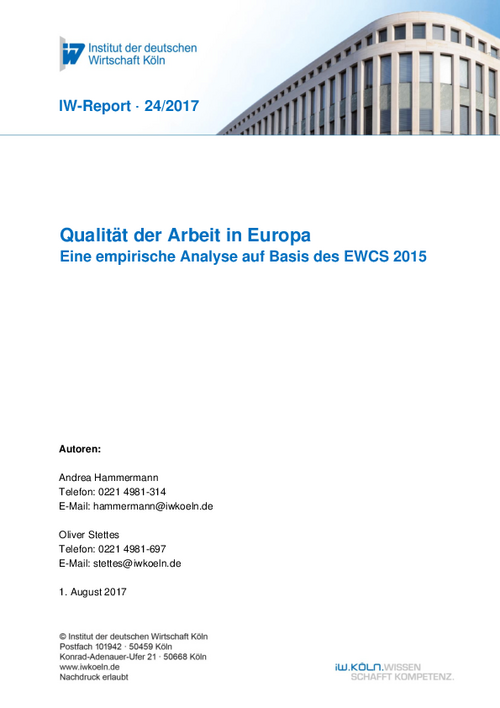Employee satisfaction signals whether employees consider the quality of their own job to be good. The share of workers in a country that are satisfied with their job is thus a measure of the quality of the jobs in an economy as a whole.

Quality of Work in Europe: An Empirical Analysis on the Basis of the EWCS 2015
IW-Report

Employee satisfaction signals whether employees consider the quality of their own job to be good. The share of workers in a country that are satisfied with their job is thus a measure of the quality of the jobs in an economy as a whole.
In this context, the quality of work in the European Union and in the individual Member States is high. Around 86 percent of workers in the European Union are satisfied with their employment relationship. In Germany, this figure is slightly higher, at 88 percent. This corresponds to the figure from 2010. In many countries, particularly in Central and Eastern Europe, the level of job satisfaction between 2010 and 2015 rose from a relatively low level to a level comparable to that in Germany. Empirical evidence of a creeping deterioration in quality of work is therefore lacking both in Germany and in the European Union as a whole. There is no political pressure to act in this context.
Econometric estimates made using the Employment Samples for the European Union and Germany show that appreciation and recognition expressed in terms of money, growth perspectives and praise have greater weighting in determining whether an employee is satisfied with their job. Equally important is a good social environment in the workplace. The empirical findings also suggest that, in many places, workplace characteristics which are perceived to be generally detrimental and which in themselves are associated with a lower degree of job satisfaction are compensated by working conditions that are perceived as being supportive. As a result, quality of work is considered good by the employees in these cases when a holistic view is taken.

Andrea Hammermann / Oliver Stettes: Qualität der Arbeit in Europa – Eine empirische Analyse auf Basis des EWCS 2015
IW-Report


Führung in der Transformation: Megatrends und Management als Motor des Wandels
Die Führungsdynamik in Unternehmen ist einem steten Wandel unterworfen, um den Herausforderungen ihrer jeweiligen Zeit zu begegnen. Heute ergeben sich die größten Einflüsse aus Entwicklungen wie dem demografischen Wandel, der Globalisierung, der ...
IW
Verwaiste Chefsessel in deutschen Unternehmen
Die Hälfte der hiesigen Unternehmen berichtete im Jahr 2023 von zunehmenden Problemen bei der Besetzung von Führungspositionen aufgrund einer fehlenden Bereitschaft auf Seiten der Beschäftigten, Führungsverantwortung übernehmen zu wollen.
IW